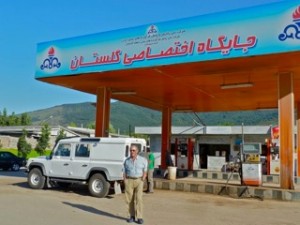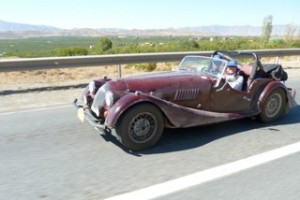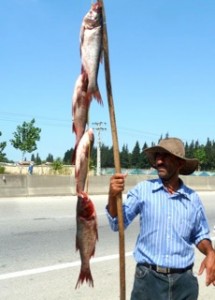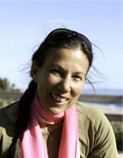I have smoked a narghile, which in Iran is called a quylan. A proper one. In Tehran. And it was good. But let me take a step back to a few days ago, when we reached a little-used border post between Turkey and Iran. Approaching from Turkey through low green hills we passed flocks of sheep guarded by proper Anatolian sheepdogs, huge, with thick grey coats and black muzzles (the dogs that is, not the sheep). I had my long, loose shirt and headscarf ready. I was, needless to say, excited. And hopeful. And a bit uncertain. How would we be treated by the border officials? Would Iranians be pleased to meet an American or angry? And would my outfit pass muster?
I needn’t have worried. The border was empty of traffic when we arrived. Within minutes we were unencumbered of our passports by a border policeman in a crisp pale-green uniform with only a modest amount of gold braid, who invited us to occupy two of the three chairs in the passport control area while he disappeared into a side room. As officials came and went from that room, we waited. I was unusually patient, primarily because I feared the consequences of asking questions. Eventually we were invited to fill in a health form, which asked us to check off whether we were experiencing any diarrhea or vomiting. Some while after that we were invited into the side room and presented with a blue ink pad on which we were asked to press our fingers and leave two sets of fingerprints on a piece of paper. A strip of gauze was proffered to wipe off our blue finger tips.
Amir, the guide assigned to us (obligatory for Americans in Iran) arrived and turned out to be a quiet-spoken young man with excellent English. Since he has to ride in our car for 4 days, that was a very good thing. His papers, too, were checked. And finally, 2.5 hours into the process, another official came out with our passports, handed them back, begged our pardon for the slowness of clearing us, and wished us a good stay in Iran. And that was pretty much that.
Iran has been a memorably heartening experience despite the fact that we are not seeing any particular sights, no palaces, shrines, or any such things. The exigencies of this particular rally are such that we have to cover long distances each day, leaving no time for anything else. So it’s the chance encounters that have to suffice. There was the pretty English Lit major in Tabriz who ran up to us as we walked along the street outside our hotel before dinner, eager to speak to us. Her favorite author is Jane Austen. The fashionably dressed mother in a fuel station restroom who showed me how to use an unusual soap dispenser and, on learning I was from America, began chatting with me and then urged her 11-year old daughter to speak with me, too.
Toll takers at highway tollbooths ask where we’re from. “America,” Bernard says, extending his hand with a 20,000 rial bill in it. “Please,” they reply. “There is no charge.” We’ve had a chat with a roadside vendor holding a tall staff from which dangled a string of illegally caught Caspian fish for sale. And two Land Rover fanatics pulled over when we parked by the side of the road for a break, eager to tell us about the Bajan, an Iranian-made version of the Land Rover; for half an hour they photographed tire treads, engine, seats and roll bar.
Everywhere are posters of Ayatollah Khomeini (dead) and Khameini (very much alive). I have learned that the posters of young men that line many street dividers commemorate those killed in the vicious Iran-Iraq war. I have been smiled at by everyone. I have done my best to keep a portion of my hair covered at all times, even in the car, but cannot hold a candle to the beautiful and chic Iranian women in their silk kerchiefs, skin tight jeans and clinging manto (that would be the Iranian form of “manteau” which is French for “coat” which, whatever the language, refers to the mid-thigh length tunic that women wear, if they’re not in a chador….which many aren’t).
When we entered Iran in the west it was harvest time for the sunflower crop, which stood in fields like so many nodding sentries, yellow heads drooping under the weight of so many seeds. The busy roads are lined with carts piled high with patent-leather green watermelons, boxes of marble-sized green and purple grapes, crates of rich red tomatoes, baskets of pale green blushing apples. A blue truck teeters under an immense load of wheat in rough brown burlap sacks. Ramadan ended on August 30, but since then it’s been one holiday after another, with whole families out for some fresh air (relatively speaking). They spread a blanket in the narrow green sward between road and field. Babies nap, men lie on their side chatting, women, the older ones in a full black chador, the younger ones in a bright headscarf and ballet flats, sit around. They pick at the food they’ve brought, seem to be dozing, or chatting, or playing.
Which brings me to that narghile. Read The Great Game: Dispatch 6-Mashhad, Iran to see a photo of Bernard smoking one……













